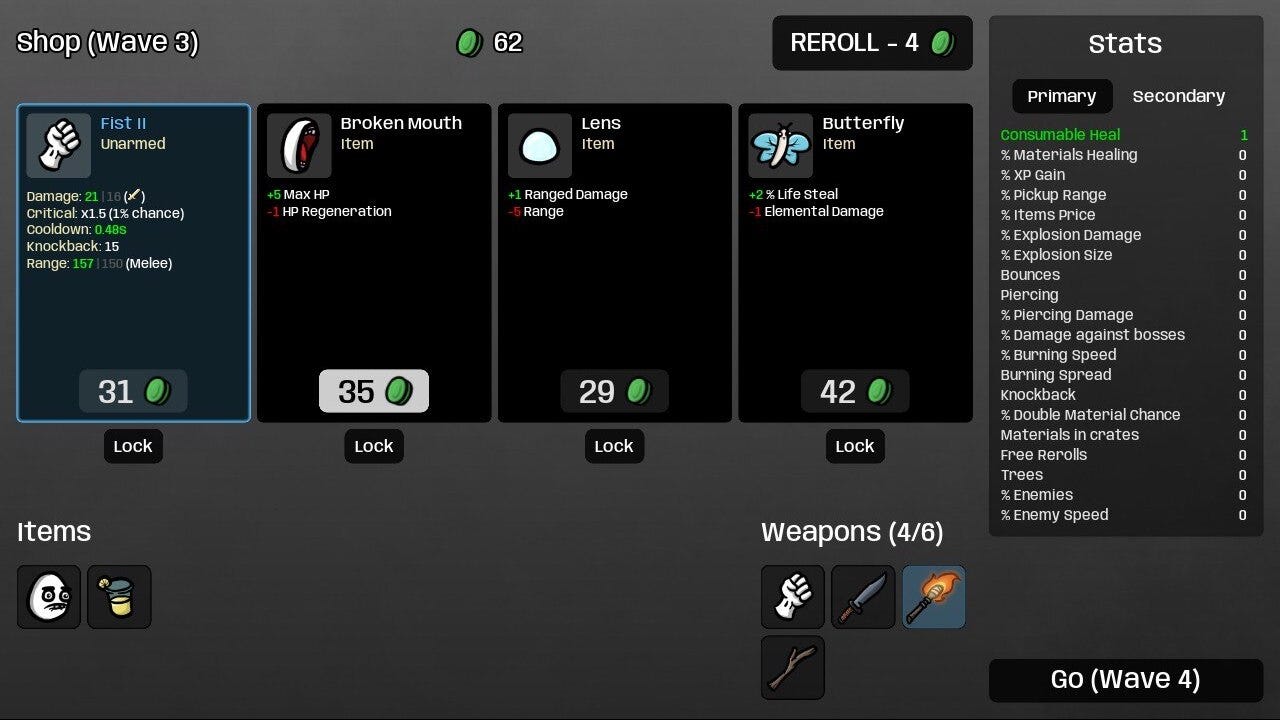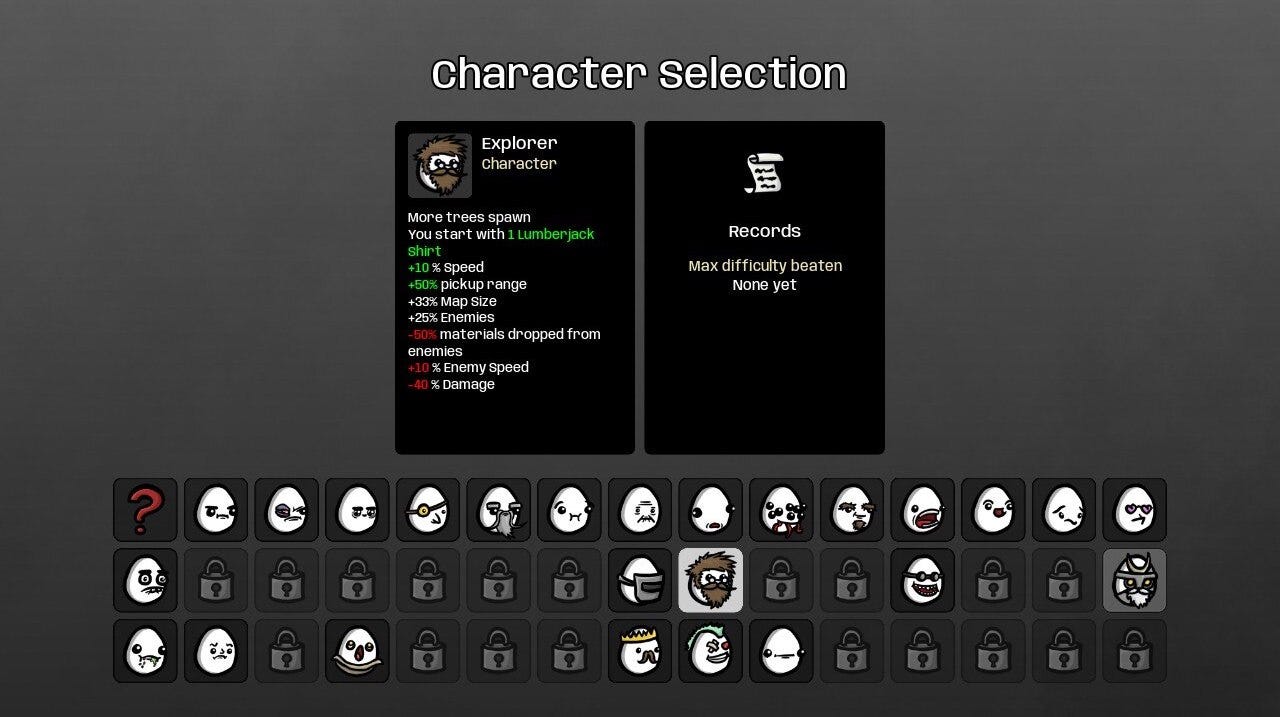Brotato
I need to delete this game
Switch, PC, Steam Deck, iOS, Android
$4.99
Endless
Brotato is a roguelite shoot ‘em up where you fight off waves of aliens in a small arena. Aiming and attacking is automatic, so all you do is move. This makes it similar to Vampire Survivors, a game so popular it’s inspired easily a thousand more since it launched a couple of years ago.
(If you’ve played Vampire Survivors you can skip this next explanation. The main thing to note that Brotato has much shorter waves and a much smaller map.)
Each wave in Brotato has the same pattern:
Enemies appear and mostly move towards you. Because you can move faster, you’re best off leading enemies around in groups so they stay within your weapons’ range but not so close they envelop you. This looks like flying a kite, hence the tactic is called kiting.
You collect green “materials” (gold and experience points rolled into one) left by killed enemies; crates containing special items; and food to restore health. Trees occasionally appear, that, when destroyed, can leave behind more of these things.
The wave ends instantly: 20s for wave 1, increasing to 60s by wave 9.
If you’ve collected enough experience points you’ll level up and can choose one of four upgrades to your stats (e.g. health, speed, damage, etc.)
You buy as many weapons or items as you like. If you don’t like the four choices available you can “re-roll” to restock the shop, though this costs increasing gold each time.
Repeat until wave 20 when you meet a boss.
Brotato is very easy. In early waves there are so few enemies that you’re chasing them down. When the enemies get tougher, faster, and start shooting things, it’s harder, yet the limited controls mean it’s easy to understand what you need to do: move better.
Crucially, the way you “move better” never stays the same, but it never changes too much, either. Every new weapon and item changes your ideal movement, whether explicitly, because you have an item that boosts your attack speed whenever you stand still; or implicitly, because of an item that builds a turret every time you destroy a tree, so you’re always running towards trees.
So when I say it’s easy, I don’t mean beginners can get to wave 20 on their first try. I also don’t mean it’s easy to learn, because the many weapons and items and upgrades interact in intricate ways. I mean that, like Tetris and Pac-Man, it’s fast and easy to play even though it can pose a challenge to experts. That alone makes it addictive (or maybe I should say “compulsive” lest the all-games-are-good police find me).
These games are made for multitasking, so easy they almost play themselves; Luca Galante, the designer of Vampire Survivors, has said “I’ve seen Twitch streamers play it while chatting with their viewers, that was indeed my original vision…” It’s “minimum viable gameplay” with the least complexity aiming for the greatest satisfaction and visual stimulation.
Unlike Tetris and Pac-Man, Brotato is a roguelite, meaning it can vary drastically from play to play thanks to the combinatorial explosion inherent in its 16 upgrades, 44 characters, 55 weapons, and 177 items. You don’t have to try them all but interesting things might happen if you do, an optional complexity that enables and rewards experimentation through replay.
Much of the reward comes from opportunistically assembling “builds” to suit particular gameplay styles. If you choose a Ranger character at the start of a game, your weapons have a much further range, so it makes sense to aim for a “ranger build”, favouring things that deliver ranged damage (like guns) over melee damage (like axes). Since you’re hoping enemies never get too close, you might neglect your health and armour and speed, whereas a “melee build” will favour those and buy mostly melee weapons for your six weapon slots. Good builds are essential for defeating the wave 20 boss, though most players seem to enjoy tinkering even if it doesn’t lead to victory.
Brotato tends to describe effects in numerical terms; an upgrade will offer Speed +3, a helmet Armour +1 and Speed -2. I normally dislike these finicky descriptors because their effects can be barely perceptible, but because waves are so short it’s possible to massively boost a stat in just a few minutes, with equally massive effects on the gameplay.
The numbers also expose how Brotato is a simulation of sorts; with a bit of luck, you can create a build with explosively bouncing projectiles that shreds the boss in ten seconds flat, like I did with a Cyborg character with no health but six maxed-out weapons. Was it challenging? No: I just stood there as my weapons fired themselves. But it was amusing to watch the simulation “break”.
That’s how Brotato remains easy despite its combinatorial explosion: your choices are highly constrained at any given moment. In fact, Brotato is shallower than many competitors, lacking a crafting system, story, large map, and more complex controls. Its shallowness is its strength, making it easier for players to hold the entire game state in their heads; you don’t have to remember where things are or what supplies you need to upgrade your base.
Probably for that reason, of all the games I’ve played this year, Brotato places me in a flow state the fastest. Flow is an annoying term, much debased by positive psychology boosters, but it’s the best description for the effortless absorption that Brotato provides. Whenever it feels too easy, the wave ends and things get harder; and if it’s still too easy, you can min/max the game by trying to pick up all the materials you can, or starting again with new characters and builds. If it gets too hard you die surprisingly quickly, and on starting over, it becomes easy once more.
Brotato troubles me. I played it when I was already running late to go out; I played it when I was meant to be writing this post; and I want to play it as soon as I finish. It’s easy. It’s narcotic.
I’m sure many find it a welcoming source of relaxation and distraction. It’s the same for me too, at least for the first twenty minutes, after which it delivers only endless regret. I don’t want Brotato to be banned or restricted any more than I want that for Civilization or Vampire Survivors. But like both of those games, I am going to delete Brotato.
Does that make it good?





